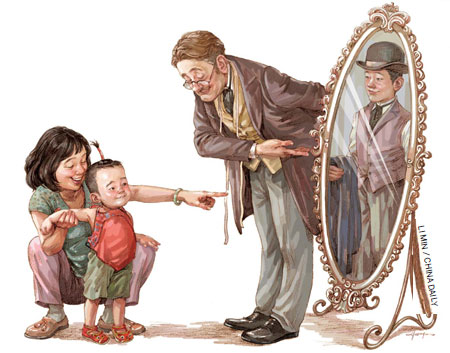Future elite: Investing in British futures
Updated: 2012-09-23 08:11
By Zhao Xu (China Daily)
|
||||||||
Some Chinese parents are placing their toddlers in line for admission to top British schools. Are they on the right track? Zhao Xu mulls the question.
British private boarding schools - the more exclusive the better - have become the top choice for wealthy or newly rich Chinese bent on giving their next generation a huge advantage, right from the start. "The youngest client we have is a 2-year-old," says William Vanbergen, founder and managing director of BE Education, an organization which provides consultancy services for students wishing to study at elite schools overseas. "We are hoping to take on a 1-year-old very soon as we are in the middle of booking a position for her in a highly regarded primary school in Britain," says Vanbergen, who studied in Eton College and sat next to Prince William in Latin class.
|
 |
Apparently, when it comes to education, it is never too early to start. And there is no compromise when it comes to quality. What else could be more befitting to these children's newly minted status as the heirs of their parents' business empires than to sit alongside young blue-blooded British?
By doing so, the parents hope the young scholars will not only rub shoulders with this privileged group, but also absorb some of their classy behavior - although Prince Harry's latest escapades at Las Vegas may make them consider the situation anew.
Sending the precious princelings and princesses abroad is not a new trend in China. Turn back the clock to 140 years ago. In 1872, a group of young aristocratics were sent to America by the then-ruling Qing court. The decision represented China's very first effort to bring up its youngest and brightest in Western education, at a time when the country's future seemed more in danger than ever.
Many of the boys would eventually return to change the country's contemporary history. Today, that memory is most powerfully evoked by a black-and-white picture, taken right before the children's departure, that can be seen in Beijing's Palace Museum.
Nearly one and a half centuries later, the Chinese still regard the journey to the West as the best academic route. There are, however, some cosmetic changes.
Now, we have girls joining the league. But the pigtails and the hoof-cuffed magua are gone, together with the sense of loss and longing that was clearly registered on those youthful faces a different era ago.
The majority of modern-day children have been abroad before - on family vacations or at elite summer camps. They know what it's like on the other side of the pond.
Instead of having to seek companionship and consolation among themselves like their forefathers many years ago, they enjoy the luxury of having an entourage of family and friends, with perhaps even a bodyguard or two.
The most glaring difference is - the State is no longer the sponsor. Their parents pay the bill.
These are the children of China's emerging super-rich.
Britain remains one of the most cultured and respectable countries in the minds of most Chinese.
Perhaps, we have to thank Jane Austen and her latter-day devotees who had turned the taciturn Mr Darcy into an international heartthrob on the screen. Her books are still best-sellers on China's Amazon book site.
To some Chinese parents, the country is a land full of noble ladies and posh gentlemen who are prim and proper, and follow rules. And rules are what Chinese parents are looking for, according to a mother of a 13-year-old girl who is now in a private school in London.

 Relief reaches isolated village
Relief reaches isolated village
 Rainfall poses new threats to quake-hit region
Rainfall poses new threats to quake-hit region
 Funerals begin for Boston bombing victims
Funerals begin for Boston bombing victims
 Quake takeaway from China's Air Force
Quake takeaway from China's Air Force
 Obama celebrates young inventors at science fair
Obama celebrates young inventors at science fair
 Earth Day marked around the world
Earth Day marked around the world
 Volunteer team helping students find sense of normalcy
Volunteer team helping students find sense of normalcy
 Ethnic groups quick to join rescue efforts
Ethnic groups quick to join rescue efforts
Most Viewed
Editor's Picks

|

|

|

|

|

|
Today's Top News
Health new priority for quake zone
Xi meets US top military officer
Japan's boats driven out of Diaoyu
China mulls online shopping legislation
Bird flu death toll rises to 22
Putin appoints new ambassador to China
Japanese ships blocked from Diaoyu Islands
Inspired by Guan, more Chinese pick up golf
US Weekly

|

|






